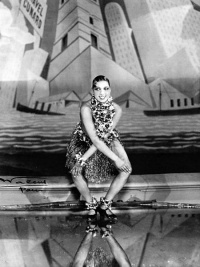Jazz
From The Art and Popular Culture Encyclopedia
| Revision as of 19:53, 20 August 2010 Jahsonic (Talk | contribs) ← Previous diff |
Revision as of 19:55, 20 August 2010 Jahsonic (Talk | contribs) Next diff → |
||
| Line 1: | Line 1: | ||
| [[Image:Josephine Baker dancing the Charleston to an Art Deco-styole background.jpg|thumb|right|200px|[[Josephine Baker]] dancing the [[charleston]] at the [[Folies Bergère]] in Paris for ''[[La Revue nègre]]'' in [[1926]]. Notice the [[art deco]] background. <br>(Photo by Walery)]] | [[Image:Josephine Baker dancing the Charleston to an Art Deco-styole background.jpg|thumb|right|200px|[[Josephine Baker]] dancing the [[charleston]] at the [[Folies Bergère]] in Paris for ''[[La Revue nègre]]'' in [[1926]]. Notice the [[art deco]] background. <br>(Photo by Walery)]] | ||
| {{Template}} | {{Template}} | ||
| - | '''Jazz''' is a [[music]]al art form that originated in [[New Orleans]], [[Louisiana]], [[United States]] in the [[early 20th century]]. Jazz blends [[Music of West Africa |West Africa]]n [[rhythm]]s with [[Western music]] [[harmony]]. | ||
| - | Although a [[high culture|highbrow art]] form - played on most [[classical music]] stations since the days of [[free jazz]]- it has its roots in quite [[hedonistic]] [[dance music]] culture such as the [[Charleston (dance)|Charleston]]. | + | '''Jazz''' is a [[music genre]] that originated at the beginning of the 20th century in [[African American]] communities in the [[Southern United States]] from a confluence of African and European music traditions. From its early development until the present, jazz has incorporated music from 19th and 20th century [[American popular music]]. Its West African pedigree is evident in its use of [[blue note]]s, [[improvisation]], [[polyrhythm]]s, [[syncopation]], and the [[swung note]]. However, [[Art Blakey]] has been quoted as saying, "No America, no jazz. I’ve seen people try to connect it to other countries, for instance to [[Africa]], but it doesn’t have a damn thing to do with Africa". |
| + | |||
| + | The [[Jazz (word)|word "jazz"]] (in early years also spelled "jass") began as a [[West Coast of the United States|West Coast]] slang term and was first used to refer to music in Chicago in about 1915. | ||
| + | |||
| + | From its beginnings in the early 20th century jazz has spawned a variety of subgenres: New Orleans [[Dixieland]] dating from the early 1910s, [[big band]]-style [[swing music|swing]] from the 1930s and 1940s, [[bebop]] from the mid-1940s, a variety of [[Latin jazz]] [[Jazz fusion|fusions]] such as [[Afro-Cuban jazz|Afro-Cuban]] and [[Brazilian jazz]], [[free jazz]] from the 1950s and 1960s, [[jazz fusion]] from the 1970s, [[acid jazz]] from the 1980s (which added [[funk]] and [[hip-hop]] influences), and [[Nujazz]] in the 1990s. As the music has spread around the world it has drawn on local national and regional musical cultures, its aesthetics being adapted to its varied environments and giving rise to many distinctive styles. | ||
| + | |||
| ==See also== | ==See also== | ||
| *[[Hedonistic roots of jazz]] | *[[Hedonistic roots of jazz]] | ||
Revision as of 19:55, 20 August 2010

(Photo by Walery)
|
Related e |
|
Featured: |
Jazz is a music genre that originated at the beginning of the 20th century in African American communities in the Southern United States from a confluence of African and European music traditions. From its early development until the present, jazz has incorporated music from 19th and 20th century American popular music. Its West African pedigree is evident in its use of blue notes, improvisation, polyrhythms, syncopation, and the swung note. However, Art Blakey has been quoted as saying, "No America, no jazz. I’ve seen people try to connect it to other countries, for instance to Africa, but it doesn’t have a damn thing to do with Africa".
The word "jazz" (in early years also spelled "jass") began as a West Coast slang term and was first used to refer to music in Chicago in about 1915.
From its beginnings in the early 20th century jazz has spawned a variety of subgenres: New Orleans Dixieland dating from the early 1910s, big band-style swing from the 1930s and 1940s, bebop from the mid-1940s, a variety of Latin jazz fusions such as Afro-Cuban and Brazilian jazz, free jazz from the 1950s and 1960s, jazz fusion from the 1970s, acid jazz from the 1980s (which added funk and hip-hop influences), and Nujazz in the 1990s. As the music has spread around the world it has drawn on local national and regional musical cultures, its aesthetics being adapted to its varied environments and giving rise to many distinctive styles.
See also
- Hedonistic roots of jazz
- Jazz photography
- Free jazz
- Jazz poetry
- Jazz funk
- List of jazz musicians
- Jazz Age
- Music of the African diaspora
- The bawdy origins of rock and roll

